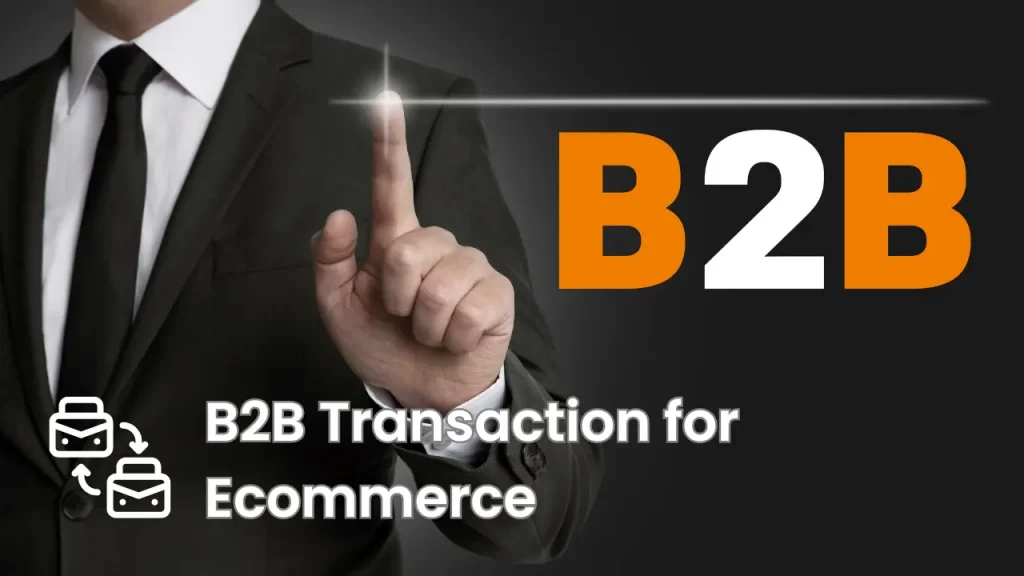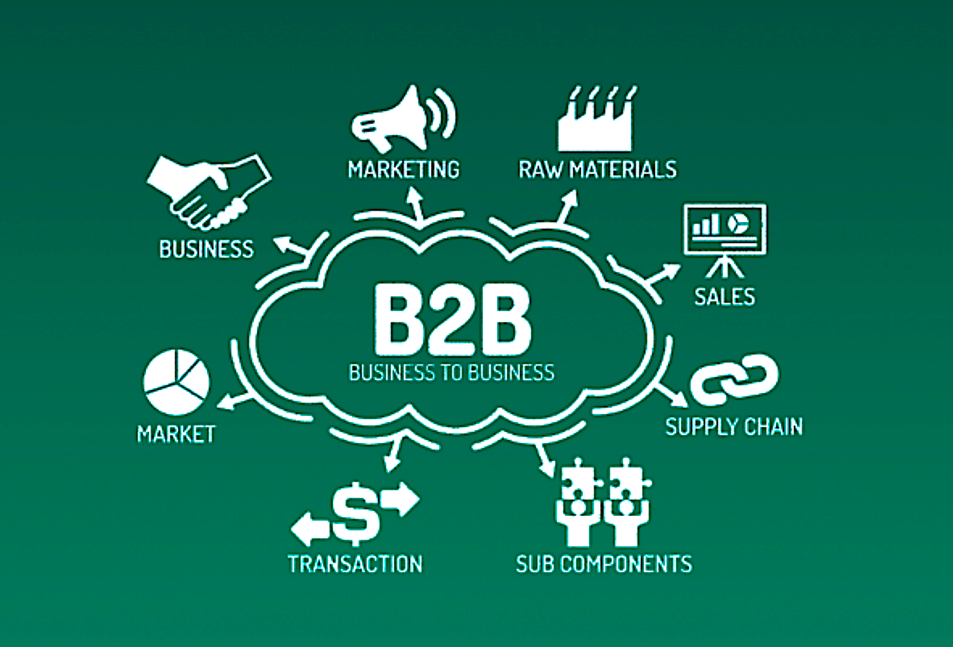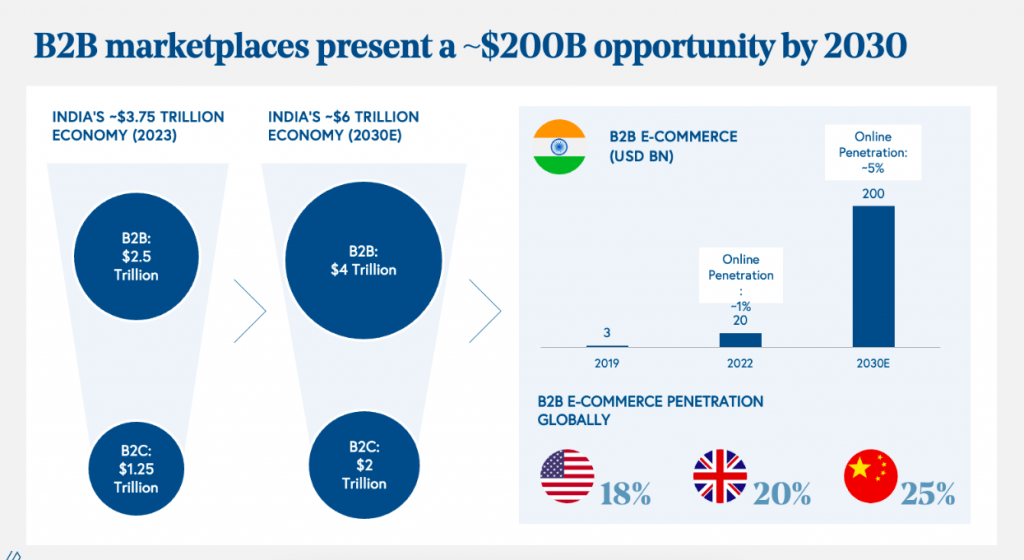How to Implement and Optimize B2B eCommerce for Your Business?

B2B e-commerce is a fast-growing segment within an increasingly digitizing world. Above all, it has become the lifeline for companies selling online. At the same time, however, B2B e-commerce marketplace problems are more complicated such as larger order volumes, complex logistics arrangements, individual strategies for pricing, net terms of payment, and long-time agreements.
Overcoming these challenges requires a solid platform that can streamline processes effectively and thus drive growth. A Forrester report discloses that, despite the hurdles a B2B company faces, bright days lie on the horizon of a B2B transaction for ecommerce. The market is posed to hit $3 trillion in about five years—moving from a 17% market share in 2022 to an impressive 24% by the year 2027. Doesn’t it make you think, B2B transaction for ecommerce are restructuring business operations?
To remain competitive, on the other hand, it takes every kind of proper optimization for your B2B e-commerce platform. The stakes here are high, but the growth potential is sky high.
Ready to learn more? Let’s dig into the general process of B2B e-commerce transactions and show your company how to survive in a fast-moving digital world.
Start with these basics and go on to learn about everything from managing complex supply chains to configuring customer-specific pricing. Now, being able to master these somewhat can give you a real leg up on the competition.
The Foundations of B2B Transaction for Ecommerce
What Exactly is a B2B Ecommerce Platform?
Business-to-business electronic commerce, unlike b2c transactions entails online transactions of goods and services among companies that sell to other businesses, rather than to direct consumers
B2B transaction for ecommerce sells goods through Virtual Storefronts for goods and uses Digital Transaction Processing to process transactions.
B2B electronic commerce is necessary in the modern business environment because it affords companies the ability to implement e-commerce strategies that would allow them to do business across the globe, operate more efficiently, and reduce costs.
Larger online ordering volumes, complex logistics, and long-standing relations between buyers and sellers are found in B2B transaction for ecommerce.
The Role of B2B Transaction for E-commerce Growth
B2B transaction for ecommerce are vital in the growth of e-commerce. With the ease of transaction between businesses these sellers have started to gain increased advantages of using digital platforms to tap a broader potential which helps in b2b cross border ecommerce operations and time zones.
Doing business at an international level opens the market with new opportunities and more chances for expansion.
In addition, B2B transaction for ecommerce business allows companies to implement ecommerce applications in the automation of purchasing procedures and toward the improvement of managing supplies and customer services.
Organizations that adopt b2b transaction for ecommerce can create long-term relationships with their clients based on seamless, efficient, and transparent transaction experiences.

Source: https://imageio.forbes.com/
The Benefits of B2B E-commerce
Streamlining Operations and Enhancing Efficiency
The process of B2B transaction for ecommerce streamline their operations and increase efficiency substantially. By automating the B2B purchasing process, businesses lower their costs and quicken the transaction pace.
For example, with e-commerce platforms, B2B businesses can automatically process online ordering, manage inventory, and enhance payment options for frictionless checkout, which directly reduces human error and increases the checkout flow rate.
In turn, such efficiency reduces operational costs and fastens delivery time, increasing profit margins. Moreover, digital platforms provide an opportunity for tracking purchasing decisions in real-time, thereby presenting a straightforward process for forecasting demand and managing inventory as to when is the most operational time to purchase products.
Enhanced Sales Opportunities and Greater Reach to Customers
B2B e-commerce paves new opportunities for companies to sell to broader companies in the world. B2B sellers subscribe to this expanded reach of B2B e-commerce in the global market.
It helps in increased business growth and sales. Online platforms make it extremely easy for a great deal of simplified checkout and payment options to be made available to meet today’s digitized buyer expectations, which makes it much easier for them to finalize their purchases.
That said, the chance of displaying products online thereby boosts brand visibility and attractiveness to potential customers, thus significantly meeting customer expectations and expanding satisfaction.
Enhanced Customer Experience
B2B e-commerce company websites exemplify a business model that focuses on providing a well-utilized and efficient customer experience. With tools including customized catalogs, special pricing, and personalized portals, it can be done to satisfy the unique needs of every customer.
That further increases by offering a streamlined and convenient purchase experience, the reason clients come back.
Moreover, online platforms give customers day-in and out access that enables the customers to place orders at the time they find possible, and therefore improves the overall satisfaction and loyalty of a customer.
Better Data Management and Analytics
Everything has advantages and disadvantages. One of the significant advantages that B2B e-commerce has introduced is the accessible data collection and analysis by businesses.
This e-commerce platform applied in B2B helps a company get detailed customer insights, sales trends, and inventory levels. A data-driven approach can help organizations make smarter decisions, optimize their operations, and align their marketing approaches.
Enhanced analytics further help businesses to identify new opportunities using customer data and market intelligence to understand various pros and cons related to different business strategies, thereby leading to better growth of companies.
Scalability and Flexibility
B2B e-commerce platforms are highly scalable and flexible to support growing businesses without requiring capital into infrastructure.
The e-commerce system can support traffic increase and growth in the number of items for sale and even increase in b2b transaction for ecommerce’s complexity as the business grows. This is important to maintain efficiency while being demanded by customers.
The flexibility of e-commerce platforms offers companies the chance to quickly realign themselves according to the shifts in the market and customer bases, thus ensuring competitiveness in the long run.
Cost Savings
Implementation of B2B e-commerce offers significant cost reductions.
Increases the volume of business, digital platforms reduce the need for physical storefronts, printed paper catalogs, and order processing done by people.
In addition, automated processes reduce the chance of errors and hence decrease costs related to labor for the handling of b2b transaction for ecommerce and inventory management. The savings can be reinvested in other business areas to provide further economic growth and profitability.
How to Optimize Your E-commerce Platform for B2B Success?
Optimize your B2B e-commerce platform to pave the way for success in the drastically competitive B2B market. Here are some of the most critical features and strategies to help you in this journey.
Essential Features
Top-notch B2B e-commerce software solution with the addition of critical features and strategies to give you a competitive advantage.
Key Features:
Custom Pricing and Quotes: Automatically adjust your pricing and quoting for B2B buyers to provide purchase volume and history access.
Tools for Automating Purchase Order Management: Automate tools such as reordering, purchase orders, and order tracking; this will maximize performance so that delivery is on time, correct, and fast that enhances customer happiness.
Advanced Search Functionality: Give your marketplace advanced search features with filters that allow fast and precise location of products for a better purchasing experience.
B2B Payment Integration: Smooth transactions through the integration of B2B marketplaces with reliable Ecommerce payment gateways supporting net terms and credit accounts that foster customer trust in the market, thus obtaining more returning customers.
User-Friendly Interface: Design an intuitive, easy-to-use interface with appropriate navigation for B2B customers that presents all information related to the products and their transaction processes to assist retention and usability.
Content and Education Marketing
Tailored content: Develop tailor-made content on how-to guides and product tutorials, mainly ways to satisfy needs that are very peculiar to B2B buyers and use the platform to position yourself as a trusted source of information.
Offer resources: Enhance your credibility by offering resources like case studies and white papers that show where you’ve deployed winning solutions, scaled other customers, and solved complex problems.
Establishing Trust & Relationships
Make Human Interface Stop: Integration of communication and collaboration tools into your e-commerce platform brings you closer to the client. Such features as live chat or customer support portals help in real-time interactivity, thus nurturing the responsiveness and reliability that clients need.
Testimonials & Success Stories: In contrast, showing customer testimonials and success stories for B2B transactions can further help to build trust. Positive experiences and tangible results will be highlighted, reassuring the potential buyer that the platform is effective and reliable.
Using Advanced Technologies
Use Powerful APIs: Read the API documentation to grasp the functions and then select the best one for your b2b online business. Leverage strong APIs to make your B2B E-commerce platform functional. It’s integrated with many other business tools, such as CRM systems and ERP solutions, and this makes data interchange smooth, and processes automated. In addition to that, Incorporating blockchain e-commerce can further enhance security and transparency which makes it crucial for B2B transactions
The Latest B2B Ecommerce Trends to Adapt: Staying ahead of modern ecommerce behavior could allow you to come out as a winner so experiment as the day is still young. It also enables you to add some innovations for higher customer engagement and satisfaction, such as AI-driven personalization and predictive analytics.
The Basics of B2B E-Commerce + Strategic Content Development: Trust Building and Technology Use Under E-Commerce Platform Optimization These strategic moves play an important role in B2B e-commerce and contribute towards making your platform competitive, efficient, and functioning effectively, to uplift the sales and reputation of your business.
Navigating B2B Ecommerce Operations
The complex nature of B2B e-commerce operations is undeniable for a proper exchange of goods and services between businesses. Key Subjects: Order Management Fulfillment Tech Solutions to Ensure Accurate Inventory B2B Payment Solutions
B2B E-commerce Operations Optimization
Order Management and Fulfillment
This is required for any B2B electronic commerce. Equipped with good order management, it is necessary to see that the orders are being well-verified by the customers without keeping the customers waiting. An excellent unified B2B platform will increase enormously in efficiency, will improve real-time updates and experiences in delivery, and will be by whatever a customer might expect. Purchase scenarios in B2B have more extensive orders and lead times and a number of other specific requirements that leading platforms manage by automatic shipping and warehouse operations.
Automated Inventory Control
Automated inventory control is implemented through automatic systems that keep track of the appropriate stock level. It saves the managers from up-and-down situations of overstock and stockouts. What is a headless commerce platform and how it makes the process even smoother by decoupling all of the front-end user interfaces with their respective corresponding back-end functions, thus allowing agile, uninterrupted integration of tech. Its integration supports ERP and CRM systems for barter forecasting and better relations with suppliers that leads to savings.
B2B Payments Solution
Payment solutions that can be applied in B2B e-commerce are one of the unique areas where business transaction requirements must be met. The amount in B2B payment solutions is frequently subjected to a much higher value than in consumer transactions and might even offer extended credit terms.
Here are the usual B2B payment methods:
Credit Terms: This enables business customers to pay on credit with terms of net 30, 60, or 90 days.
Purchase Orders: An official document sent out to suppliers that gives specifications for the goods they are to buy and prices agreed upon, thereby reducing ambiguity and disagreements.
ACH Transfers: They are electronic payments that directly send funds from one bank account to another at a low cost. Secure way of b2b transaction for ecommerce recuring between businesses.
Wire Transfers: Most preferred for their speed and reliability in bulk and urgent transactions.
Credit Cards: Still not so widely used, considering the transaction fee, but are facilitated for possible convenience with faster processing.
Strategies for Successful B2B Marketing
Coming from offline to online channels, using digital tools for engaging with the customers and creating ecommerce loyalty rewards programs are some of the core strategies that can be used to make B2B marketing work.
How it is to be effectively applied to grow B2B transaction for ecommerce is explained below:
Shifting Customers from Offline to Online Channels
Migrating business customers from offline to online channels involves strategic planning and motivation.
Providing special discounts or other exclusive promotions online can encourage clients to migrate. For instance, 10% off the first online order could be pretty lucrative. Other migration tools include amenities to make data transfer smooth in a way that is also lucrative for clients’ shifts, thus decreasing the friction of moving their operations online.
One way companies can do this is by coming up with comprehensive online guides and tutorials for ecommerce navigation through the new digital platform. This does not only make the transition but also increases customer satisfaction so that they know how best to go about it. Email campaigns will inform existing offline customers what to do and how easy the new online system is.
Using Digital Tools to Educate and Engage B2B Customers
Digital tools are essential in educating and engaging B2B customers. Content marketing is also done through webinars and social media to attract business clients.
Companies should post blog articles and other kinds of content around industry challenges and how to solve them to make a name for themselves within thought leadership in the B2B space.
This can be done to provide insights into the client or build up their trust. Webinars offer a more interactive way to engage with customers. Hosting webinars on relevant subjects can be an excellent way to educate and offer live forums to address questions and build more engaging relationships.
Similarly, B2B companies can use social media, especially LinkedIn and Twitter, for online selling that can reinforce the digital platform. Companies could generate more traffic to their online channels by giving regular updates, posting informative posts, and responding to queries and followers.
Develop Programs to Boost Loyalty and Repurchase Rates
For example, it is essential to develop a good customer relationship within the B2B segment. The design of customer retention and loyalty programs can enhance the repurchase rate among customers.
For example, loyalty based on points earned on every purchase, redeemable by them in the future for discounts or complimentary products, can drive repeat purchases. Examples include volume discounts:. Incentives in large orders make the customer buy more, hence increasing the sales volume. The other improvement within the relationship may be met with personalized customer service according to every client’s specifics. Regular follow-ups, customized offers, and dedicated account managers ensure clients feel valued and understood, promoting long-term loyalty.
Align Business Processes to Scale B2B Business Operations
Scaling the largest B2B transaction for ecommerce to align means selecting the right B2B eCommerce platform. Magento, Shopify Plus, and BigCommerce B2B Edition appear to be the most popular platforms in this genre.
Some long-standing benefits of the BigCommerce B2B Edition include personalized customer service, advanced engine optimization, and feature matching that help scale B2B operations with increasing efficiency.
An advanced B2B organizations solution, such as BigCommerce B2B Edition, is designed to help businesses sell online more in bulk, manage long-standing relationships, and optimize the B2B buying process.
Such platforms make a company’s digital transformation by improving their sites for better digital commerce. Unlike in B2C ecommerce website and its transactions, B2B systems will always focus on customer loyalty by extending the features that address the unique needs of potential customers and businesses.
A dedicated solution optimizes the process of conducting sales online and, in essence, allows this transformation of B2C businesses into B2Bs with greater ease. This delivers better customer service and higher-quality marketing tips on attracting more B2C customers, which together means a successful strategy for digital commerce.
The Future of B2B E-commerce
The future of B2B transaction for ecommerce is shaped by the integration of digital advancements and a deep understanding of evolving customer needs. According to Gartner Magic Quadrant, 80% of B2B sales interactions are expected to shift to digital channels by 2025, highlighting a significant move towards online environments in the B2B space.
The projected growth of B2B commerce, with a CAGR of 18.30% and an expected market size of over USD 18.97 trillion by 2028, underscores the critical nature of digital transformation in this sector.
B2B companies should advance their digital commerce capabilities through further attributes like mobile commerce and ecommerce personalization, which make them not just meet customer requirements but go a step further to predicting those requirements.
This will grow not only the B2B business but also result in long-standing relationships with clients. Such hybrid model customer service: chatbots plus human support, besides serving both kinds of customers, will also be effective when applied jointly. It ensures value addition in every interaction, fostering customer loyalty and setting the stage for a dynamic future in digital commerce.

Source: https://www.bvp.com/
FAQs
What is the expected growth rate for the B2B e-commerce market?
The B2B e-commerce market is experiencing rapid growth and is projected to reach approximately $18.57 trillion by 2026, indicating a significant expansion from its current size.
What technological trends are influencing the future of B2B e-commerce?
Technological advancements such as artificial intelligence (AI), machine learning, and headless commerce architectures are pivotal. These technologies enhance the customer experience by providing more personalized and efficient services, and they help businesses adapt quickly to market changes
What is the expected growth rate for the B2B e-commerce market?
The global B2B e-commerce market is expected to reach $8.5 trillion by 2026, which represents a significant growth of 56% from 2018.
Why should traditional B2B businesses adopt ecommerce strategies?
Adopting ecommerce boosts operational efficiency, expands market reach, and enhances response times to customer demands. Future B2B and B2C ecommerce platforms will offer integrated solutions that helps traditional B2B businesses to sell directly to customers, including individual buyers and suppliers, and sell globally. This transformation will improve the checkout process, making it easier for traditional businesses to thrive online in the B2B ecommerce market.
What challenges would a traditional B2B company face in the adoption of e-commerce?
Most problems in traditional B2B companies arise from legacy systems, resistance to change, and complex product listings when adopting digital transformation. These, therefore, need strategic planning for investment in technology and training for its integration and adoption.
Craft Your B2B transaction for Ecommerce Strategy
B2B e-commerce is one of the biggest growth drivers in business sectors today; it has complex logistics, a large volume of orders, and customized pricing strategies. All this is done so that work can move smoothly, to cut operation costs, and to make it possible to reach over into new markets.
To be able to maximize the potential of your B2B ecommerce platform, some of the critical inclusions would be custom pricing, advanced order handling, as well as ecommerce payment gateway. Afterward, you must engage with strong-fit customers with ecommerce personalization, educational resources, and robust communication features.
This means, moving ahead, it will be all about how to effectively adopt the available digital tools and trends like such as personalized mobile commerce solutions and hybrid customer support for ecommerce, in order to be more adaptive to industry changes and optimally enhance buyer engagement.
Want to take your B2B transaction for ecommerce to the next level and even more sales opportunities? Consider our well-regarded ecommerce app development services and then request a consultation on how to customize your strategy concerning the unique needs of your business. Let’s innovate your B2B e-commerce approach and drive success in this fast-evolving digital landscape.


